Why ‘Brexit’ will make Britain’s mediocre economy worse
An observer of Britain’s “Brexit” debate would be forgiven for thinking that the country’s economy is one of the European Union’s star performers. Brexit’s advocates rarely pass up an opportunity to claim that the European Union economy is the world’s weak link, and that Britain’s reformed, dynamic and flexible economy has little to risk, and much to gain, from leaving it. The reality is rather different. And Brexit threatens to make matters worse.
Britain’s economic performance relative to the other big economies in Western Europe — including France, Germany, Italy and Spain — does not stand out as impressive, at least once the different prices of goods and services across these countries are factored in. As the chart below shows, British economic growth between 2000 and 2015 lagged behind Spain and Germany.
GDP per capita growth
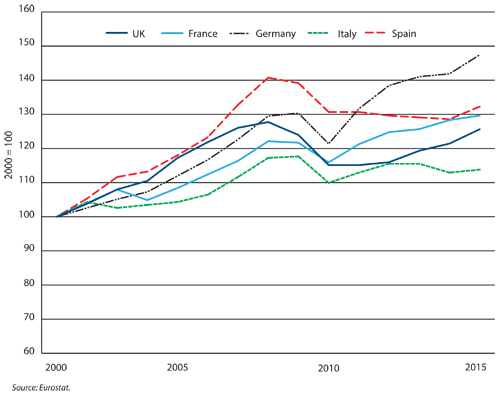
And in 2015 Britain ranks only slightly ahead of France, a country that has become synonymous in Britain with economic weakness.
Sustainable increases in living standards require economies to combine land, labor, capital and technology in more efficient ways; Britain has made a poor job of this, helping to explain why Britons’ wages have risen by much less than their French and German counterparts over the last 15 years.
Growth of average annual wages
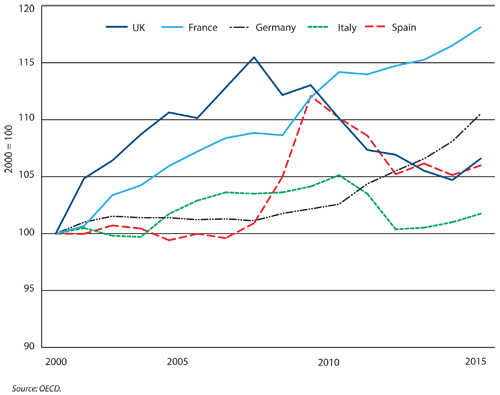
It also explains why Brits have to work longer hours than the French or the Germans to earn a comparable income, as the chart below shows.
Average hours worked, per employee
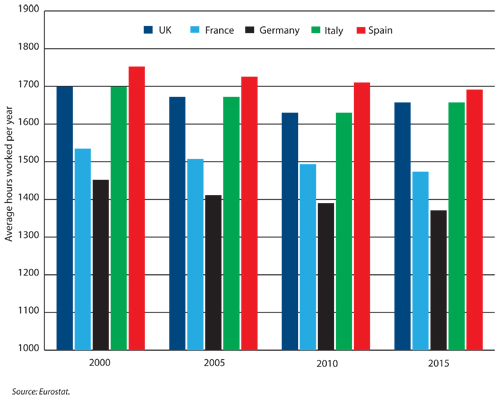
If the country’s overall performance looks mediocre, note that it is also highly skewed by London and the southeast of England. In one of the most politically centralized democracies in the world, regions as economically diverse as the northeast of England and London are essentially run as if they face the same challenges, and, Scotland aside, those regions have scant scope to tailor policies to their particular needs. This is part of the reason why, since 2000, poorer regions of Britain have not been catching up with the richer regions of the European Union. Instead, they’ve been falling further behind.
Regional GDP per capita
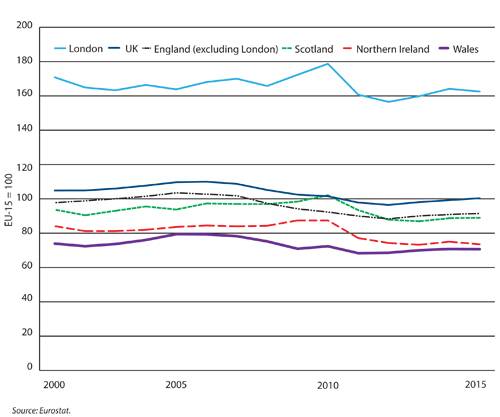
So, why has the country’s performance been so poor? The British government overdid austerity between 2010-12, but not by as much as the Germans, Italians or Spanish and by about the same as the French. And there is no evidence that government borrowing is “crowding out” private sector investment by taking up too much of the available financing: interest rates are extremely low, pointing to a surfeit of savings over profitable investment opportunities.
That leaves supply-side failures. Britain is generally perceived as a liberalized economy, and by some measures of labor market performance this is no doubt true: Non-wage labor costs, such as employer contributions, are low and it is easy to lay off workers, which reduces the costs of taking them on in the first place. But a successful labor market requires more than easy hiring and firing; it needs skilled workers, access to housing and good quality infrastructure. By these measures Britain has some real weaknesses.
A significantly higher proportion of British 18- to 24-year-olds suffer from weak literacy and numeracy than those in France, Germany, Italy or Spain.
Low literacy and numeracy among 18 to 24 year-olds
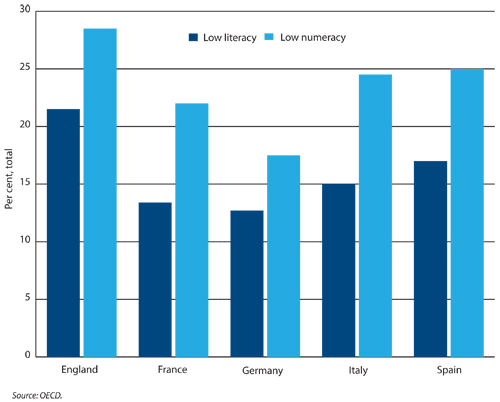
And, despite strong population growth and rapid price increases, Britain is building around half as many houses as in the 1970s, and the supply of subsidised (or social) housing has pretty much dried up, making it difficult for many British workers to move to where the jobs are.
Good infrastructure increases productivity by raising the return on investment and boosting foreign trade and can play a major role in addressing regional disparities. But, as the chart below shows, the country has invested less in roads, railways and air travel than other large European Union economies over the last 20 years.
Infrastructure investment as a percentage of GDP
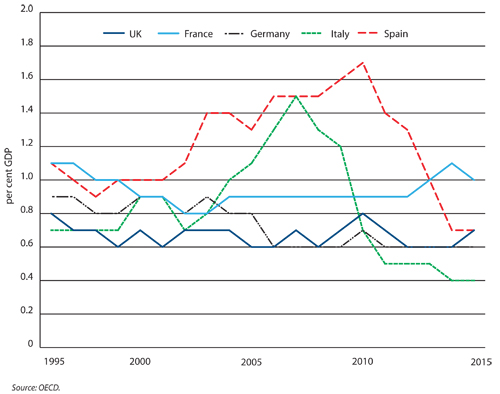
A Britain outside of the European Union will inevitably be less open to trade with member states, which will curb competition and productivity growth. Tax revenues will fall, further squeezing infrastructure investment and education spending. That’s why, far from liberating Britain to conquer world markets as a buccaneering trading nation, Brexit threatens to make its mediocre economic performance even worse.
Source: Centre for European Reform
